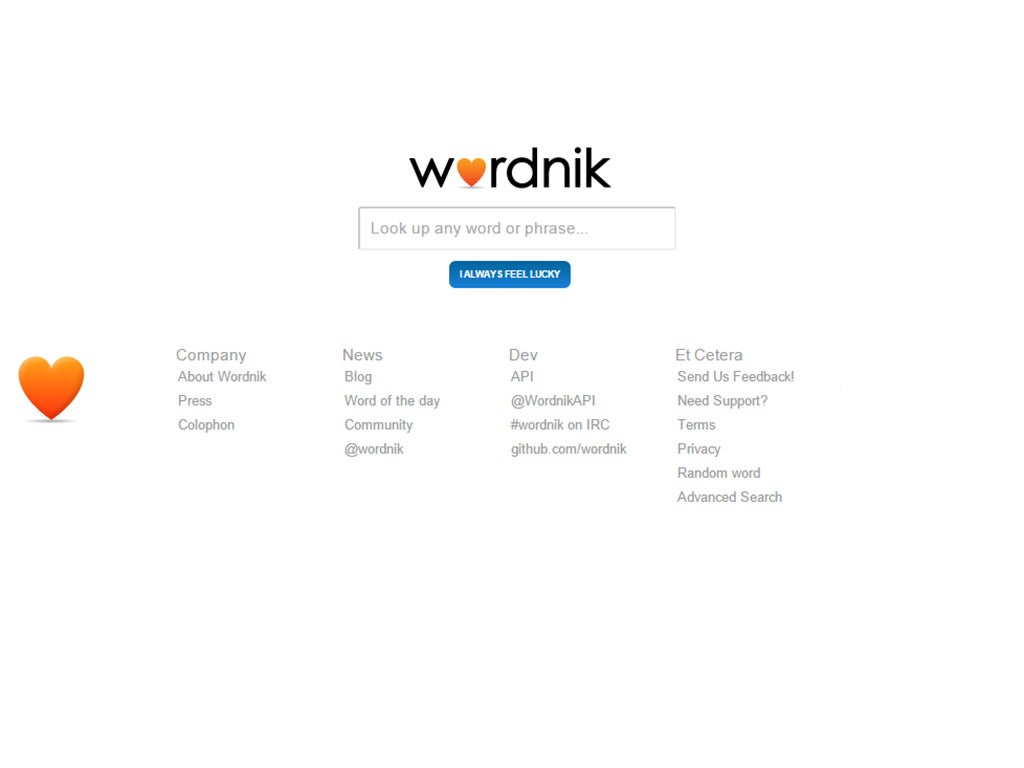The online dictionary Wordnik aims to log every English utterance out there
Fresh from a funding drive, its founder explains why they all deserve a chance

In September, the announcement of the newest words added to the Oxford English Dictionary made headlines (as it always does). The list included “hoverboard” and “concelebrated” (“of a mass: officiated by two or more priests”). These are fine English words that deserve a place in the dictionary – but then so does every other word of English.
As a dictionary editor with 20 years’ experience (I worked on American children’s dictionaries and then for Oxford University Press before founding the online dictionary Wordnik in 2008), I believe that every word should be lookupable.
That dictionaries should include every word by default is by no means a new idea. Dean Richard Chenevix Trench, whose 1857 address to the English Philological Society kicked off the project that eventually became the OED, declared that “the lexicographer is making an inventory . . . Where he counts words to be needless, affected, pedantic, ill put together, contrary to the genius of the language, there is no objection to his saying so; on the contrary, he may do real service in this way: but let their claim to belong to our book-language be the humblest, and he is bound to record them, to throw wide with an impartial hospitality his doors to them, as to all other”.
Perhaps it was easier in the pre-internet era to dismiss the gaps in our word inventories, but today even a cursory search brings up tens of thousands of overlooked words such as “shorkie” (a Shih Tzu-Yorkshire terrier mix), “firenado” (a tornado of smoke, fire and burning debris), or “microhood” (a very small but distinct part of a neighbourhood or a microwave oven intended to be installed above a range).
In fact, there are more English words not in dictionaries than there are words in them: a study published in Science found that “52 per cent of the English lexicon – the majority of the words used in English books – consists of lexical ‘dark matter’ undocumented in standard references”.
And these missing words are not difficult to find: not when you have computers to do the gruntwork and billions of words of digitised text available to dig through. Our tools have finally caught up with our lexicographical goals – which is why Wordnik launched a Kickstarter campaign to find a million words missing from traditional dictionaries.
At the time of going to press, with just over two days to go, we have more than 600 backers and have surpassed our goal of $50,000. Rewards for backers include the right to “adopt” a word for a year, stickers, T-shirts, and an honest-to-goodness medal “for lexicographic valor”.
We’re looking for example sentences using these missing words – both to prove that they actually exist and are used by English speakers, and to show people how they’re used and what they mean. We collect sentences instead of writing definitions because we believe that words are best learned by example. (Think of how few of the words in your working vocabulary you learned by looking them up in a dictionary.)
Although the response to our campaign has been overwhelmingly positive, a few naysayers have complained that by adding these obscure words, we’re “cluttering up the dictionary”. But just because a word is included in a dictionary doesn’t mean you have to use it (nor does it mean you have to condone other people using it). You don’t visit every place you see on a map; why should you feel compelled to use a term just because it’s part of the language?
Speakers of English are rightfully proud of the vast size and variety of words in the language. We have hundreds of words meaning “drunk” (including “nimptopsical” and “swipey”); adjectives for every possible kind of shape (such as “scutiform”, meaning “shield-shaped”, and “glandarious”, for acorn-shaped things); and verbs for every form of perambulation (“daddle”, “to walk unsteadily”; “langle”, “to saunter slowly”). There’s even a word to describe words that are exactly the right word for what you want to say – “teleolexical”. Why wouldn’t we want to give every word a chance to be someone’s teleolexical word?
Join our commenting forum
Join thought-provoking conversations, follow other Independent readers and see their replies
Comments